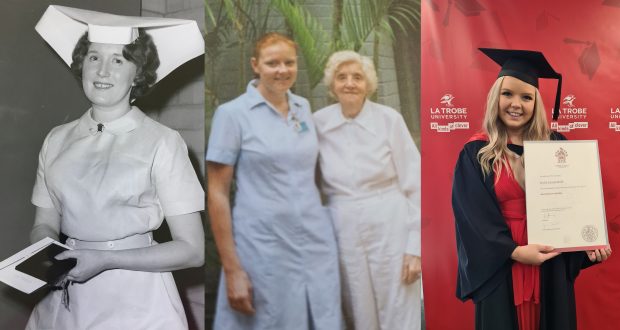For some people a profession is what pays the bills, somewhere they go every day for eight or so hours. Others are more lucky and can say their profession is something they love to do, a calling, and for an even smaller group of people their profession seems pre-ordained as if it is in their blood.
That could be said of Kylie Rofe, a recent graduate of nursing from La Trobe University who is now the fourth generation of her family to enter the nursing profession.
The nursing lineage in her family goes all the way back to her great grandmother, Edith Seymour, then on to her grandmother Cynthia Barr and her mother Janine Rofe, who is still a practising nurse and local medical centre practice manager.
“I’m really proud of her,” Janine tells Nursing Review.
“She only decided late to be a nurse, but mum and I both knew she was born to be a nurse. She was always going to do it before she even realised.
“She’s just that type. She’s a really caring, compassionate person.”
Edith Seymour started the tradition for the women of Kylie’s family back in London in the early part of last century.
Inspired to enter the profession by memories of injuries her father suffered from World War I, and needing to help her family survive after his death, Edith lied about her age and became a nurse aged only 16, two years shy of the legal age.
She worked her way through World War II in the UK and told her family stories of the scores of women who went into unexpected labour as bombs fell on London nightly during the Blitz.
Edith moved to Australia in 1949 and spent the rest of her career as a bush nurse in Glenwills in rural Victoria, before her daughter Cynthia entered nursing training at Wangaratta Base Hospital in 1961. Cynthia nursed for 37 years in Benalla, Sale and Traralgon in the surgical, theatre and emergency departments.
“When Mum did nursing there wasn’t a lot of choice. It was either you become a teacher or a nurse for women. If you were going to get qualified at anything they were the only two real jobs on offer,” Janine says.
“My mum told me not to do nursing and I went and did it. I don’t think she loved it as much as Kylie and I do and my grandma did,” she remembers.
“I think I was the same as Kylie, really. I kind of always wanted to do it. We used to play with the little nurse’s kit when you were young. I was really fascinated with it and I loved going into the hospital to visit mum and the smell of it and everything. It was really weird. And I still love going into a hospital now.”
Janine went on to work all over Australia as a nurse before settling back in Victoria and working for 10 years in Benalla’s emergency department, another family tradition that daughter Kylie will enter into.
“She did six weeks of her training at the hospital and loved it. And I don’t know what it is with us. There’s something about emergency that suits us. We like the adrenaline rush, I think,” Kylie says with a laugh.
“And you never get bored. That is one thing I remember my grandmother saying. It was good because you never knew what was going to come through the door.”
Like many young nurses, Kylie has had a tough introduction to the profession this year, completing her emergency placement during the height of Melbourne’s second coronavirus wave.
And as she awaits the start of her grad job at The Northern Hospital, she’s been spending the summer working at testing clinics and with the hotel quarantine sites as a COVID marshal with the Australian Open tennis.
All good practice for someone who, it seems, was destined for the job.
“I feel really proud, but it’s also a bit hard having to live up to the reputation,” she says with a nervous laugh. “But seeing the impact they had on people’s lives, I wanted to do something like that and this is the perfect profession to go into.”
And she is now looking to put all that she has learned from three generations of hard working nurses to good use helping others.
“I learned to trust your gut, go with your instincts. They seemed to have always done that in conflict situations at work and it worked out well.
“Hospital can be a scary place, so being a person who helps people feel more comfortable and secure is important to me,” she says.
“I want to help them feel better in what can be one of the worst moments of their life and when they’re most vulnerable.”
Do you have an idea for a story?Email [email protected]
 Aged Care Insite Australia's number one aged care news source
Aged Care Insite Australia's number one aged care news source

